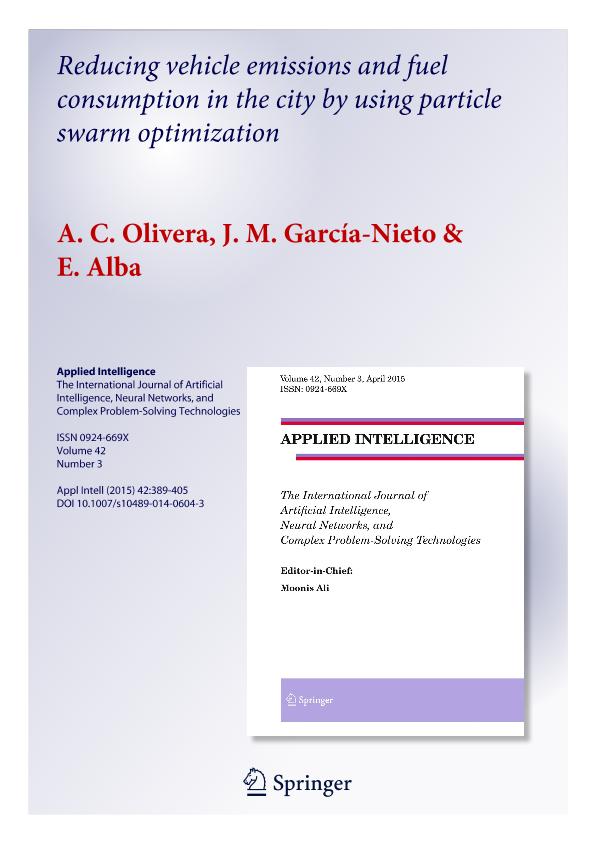Mostrar el registro sencillo del ítem
dc.contributor.author
Olivera, Ana Carolina

dc.contributor.author
García-Nieto, J.M.
dc.contributor.author
Alba, E.
dc.date.available
2018-03-09T17:43:14Z
dc.date.issued
2015-04
dc.identifier.citation
Olivera, Ana Carolina; García-Nieto, J.M.; Alba, E.; Reducing vehicle emissions and fuel consumption in the city by using particle swarm optimization; Springer; Applied Intelligence; 42; 3; 4-2015; 389-405
dc.identifier.issn
0924-669X
dc.identifier.uri
http://hdl.handle.net/11336/38413
dc.description.abstract
Nowadays, the increasing levels of polluting emissions and fuel consumption of the road traffic in modern cities directly affect air quality, the city economy, and especially the health of citizens. Therefore, improving the efficiency of the traffic flow is a mandatory task in order to mitigate such critical problems. In this article, a Swarm Intelligence approach is proposed for the optimal scheduling of traffic lights timing programs in metropolitan areas. By doing so, the traffic flow of vehicles can be improved with the final goal global target of reducing their fuel consumption and gas emissions (CO and NOx). In this work we optimize the traffic lights timing programs and analyze their effect in pollution by following the standard HBEFA as the traffic emission model. Specifically, we focus on two large and heterogeneous urban scenarios located in the cities of Malaga and Seville (in Spain). When compared to the traffic lights timing programs designed by experts close to real ones, the proposed strategy obtains significant reductions in terms of the emission rates (23.3 % CO and 29.3 % NOx) and the total fuel consumption.
dc.format
application/pdf
dc.language.iso
eng
dc.publisher
Springer

dc.rights
info:eu-repo/semantics/openAccess
dc.rights.uri
https://creativecommons.org/licenses/by-nc-sa/2.5/ar/
dc.subject
Hbefa Traffic Emission Model
dc.subject
Sumo Microscopic Simulator of Urban Mobility
dc.subject
Traffic Lights Timing
dc.subject.classification
Ciencias de la Computación

dc.subject.classification
Ciencias de la Computación e Información

dc.subject.classification
CIENCIAS NATURALES Y EXACTAS

dc.title
Reducing vehicle emissions and fuel consumption in the city by using particle swarm optimization
dc.type
info:eu-repo/semantics/article
dc.type
info:ar-repo/semantics/artículo
dc.type
info:eu-repo/semantics/publishedVersion
dc.date.updated
2018-03-09T14:44:22Z
dc.identifier.eissn
1573-7497
dc.journal.volume
42
dc.journal.number
3
dc.journal.pagination
389-405
dc.journal.pais
Alemania

dc.journal.ciudad
Berlin
dc.description.fil
Fil: Olivera, Ana Carolina. Universidad Nacional de la Patagonia Austral. Unidad Académica Caleta Olivia. Departamento de Ciencias Exactas y Naturales; Argentina. Consejo Nacional de Investigaciones Científicas y Técnicas; Argentina
dc.description.fil
Fil: García-Nieto, J.M.. Universidad de Málaga; España
dc.description.fil
Fil: Alba, E.. Universidad de Málaga; España
dc.journal.title
Applied Intelligence

dc.relation.alternativeid
info:eu-repo/semantics/altIdentifier/doi/http://dx.doi.org/10.1007/s10489-014-0604-3
dc.relation.alternativeid
info:eu-repo/semantics/altIdentifier/url/https://link.springer.com/article/10.1007%2Fs10489-014-0604-3
Archivos asociados
